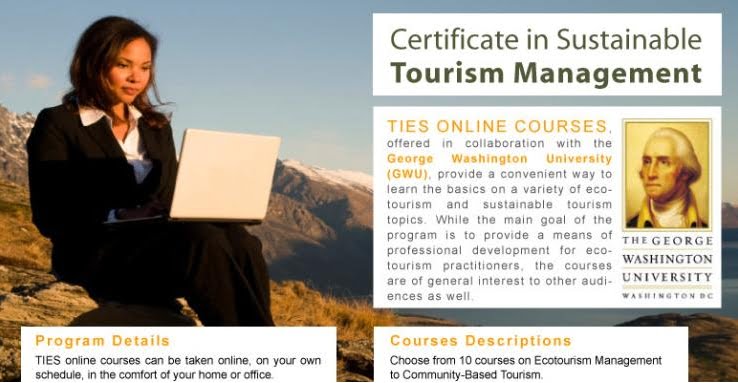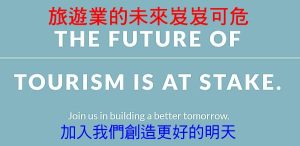國際生態旅遊協會開辦永續旅遊經營管理線上認證課程
賴鵬智翻譯 吳宗瓊審定
2014年4月國際生態旅遊協會推出永續旅遊經營管理線上認證課程,該課程有三個必修的核心課程及六個選修課程,我將該認證課程的介紹內容擇要翻譯(中英對照),敬請參考。藉著瞭解這些課程內容,也讓我們可以知道一個專業的永續旅遊或生態旅遊人才需要具備的基本知能有哪些。感謝美加英文補習班陶維極老師指導及國立東華大學觀光暨休閒遊憩學系吳宗瓊教授協助潤飾及審定我的翻譯。
國際生態旅遊協會(The International Ecotourism Society)自2014年4月起與喬治華盛頓大學(George Washington University)國際觀光研習中心(International Institute of Tourism Studies)合作開辦專業的永續旅遊經營管理線上認證課程(Certificate in Sustainable Tourism Management),提供有志者接受一流學府生態旅遊與永續旅遊專家指導的機會。
該認證課程分為三個核心課程及三個選修課程。三個核心課程為永續旅遊評估與發展、生態旅遊經營管理及永續旅遊地行銷,每項課程註冊費是美金450元,如果是國際生態旅遊協會會員則可減免美金25元。(The core courses are Sustainable Tourism Assessment and Development, Ecotourism Management, and Sustainable Tourism Destination Marketing, Each course costs $450 to register, and current TIES members receive a US $25 discount on each course.)
認證課程屬於自學性質,可以在家或辦公室自訂時程在線上學習。無論是單一課程或整體認證課程,每項課程都在提供學習者精進專業水準所需的知識與技能。課程中每一單元都有一本可以下載的學習手冊及線上資源(部分單元含有多媒體簡報)。在研習完相關單元後,必須填寫簡短考卷,如果順利通過測驗,表示該課程及格。研習者通常以一個月的時間完成一項課程(約當大學12小時課程)。
底下是三種核心課程的介紹與相關單元內容:
一、永續旅遊評估與發展(Sustainable Tourism Assessment & Development)
全球觀光旅遊快速發展,為已開發及開發中的旅遊地帶來許多挑戰與機會。課程目的在學習運用觀光評估方法檢視旅遊發展的潛力,以及觀光發展計畫之潛在成本與效益的測量與估計。(The rapid growth of tourism worldwide has created many challenges and opportunities for established and emerging tourism destinations. This course looks at how to conduct a tourism assessment to examine tourism potential, and how to measure the potential costs and benefits of a tourism development program.)
課程單元包括:
• 旅遊地經濟的開展(Expand economic developmentin your destination)
• 社區領導模式的發展(Develop a community leadership model)
• 遊客資訊及經濟影響資料的彙整(Compile visitor profiles and economic impact data)
• 觀光與地方發展之居民態度調查(Survey resident attitudes regarding tourism and its development)
• 與權益相關者討論設定願景及目標(Conduct visioning and goal setting activities with your stakeholders)
• 以需求導向的行銷手法評估觀光發展潛力(Assess tourism potential using a demand-driven marketing approach)
• 以吸引力及供給設施分析法評析旅遊地競爭優勢(Conduct a preliminary competitive-advantage analysis, using attraction and facility inventory techniques)
• 尋求有助於經濟發展或促進投資目標的可能方案(Identify potential projects that contribute to economic development or investment promotion goals)
• 社會、經濟與環境執行計畫分析(Implement social, economic, and environmental project analyzes)
• 建立策略聯盟及夥伴關係(Establish strategic alliances and partnerships)
二、生態旅遊經營管理(Ecotourism Management)
生態旅遊被認為是在不必犧牲社區價值與耗損環境品質下,透過增加觀光收益的一種經濟上可行的替代式發展模式。課程目的在讓觀光規劃者、保育者、產業、社區學習相關知識與技術,得以在重視自然資源保育及照顧居民福祉下,共同發展足以吸引與服務生態旅遊遊客之生態旅遊規劃與產品。課程設計在協助研習者瞭解生態旅遊產業的獨特架構,及最新的生態旅遊市場行銷與產品發展。(Ecotourism has proven to be an economically viable alternative for attracting tourism revenue without compromising local community values or degrading the environment. This course provides the tools needed by tourism planners, conservationists, businesses and communities to work together to develop ecotourism plans and products that will attract and accommodate the ecotourist while conserving natural resources and benefiting local people. Designed to help you understand the unique structure of the ecotourism industry, the course provides the most recent information on ecotourism marketing approaches and product development.)
課程單元包括:
• 生態旅遊基本元素、市場及趨勢(Understand the basic elements of ecotourism, the market and market trends)
• 評估生態旅遊團客或散客市場的潛力(Assess the potential of individual and group ecotourist specialty markets)
• 運用綠色準則經營成功的生態旅遊事業(Use green guidelines for operating a successful ecotourism business)
• 分析與強調生態旅遊遊客及社區的特殊需求(Analyze and address the special needs of ecotourists and local communities)
• 發展地方或區域層級的生態旅遊規劃步驟(Establish an ecotourism planning process at the local and regional levels)
• 開展安全又具豐富體驗的遊程與套裝(Develop trip circuits and travel packages that are safe and offer a wide variety of experiences)
• 瞭解解說與教育的關鍵角色與附加價值(Understand the vital role of interpretation and education in adding value)
三、永續旅遊地行銷(Sustainable Tourism Destination Marketing)
此課程提出一套可操作的、精選的且充滿創意的旅遊地行銷方法,檢視遊客如何及為何選擇旅遊地的理由,並學習如何發展強調旅遊地特殊訴求的策略行銷系統。此課程採用實務案例研習,如何在更好地監察、成本管控及評量下,增加行銷策略的效益。(A practical, intensive, idea-packed approach to marketing tourism destinations. Examine how and why tourists make destination choices, and learn how to develop a strategic marketing system that emphasizes your destination’s distinctive appeal. The course features case studies, and practical tips for stretching marketing dollars through better monitoring, cost controls and evaluation.)
課程單元包括:
• 尋找與吸引有利基的區隔市場(Identify and attract profitable market segments)
• 創造遊客受益有感的吸引力(Create appeals that resonate with visitor benefits)
• 建立策略聯盟及公私合作的夥伴關係(Establish strategic alliances and public-private partnerships)
• 準備行動導向的行銷計畫(Prepare an action-oriented marketing plan)
• 在遊客消費型態中尋找商機(Spot opportunities in tourist spending patterns)
• 瞭解目標遊客群的喜好(Track preferences of target visitors)
• 增加自然與文化景點的價值(Add value to natural and cultural attractions)
• 景點的創造與鏈結(Create and link attractions together)
• 效法及應對競爭者的策略(Benchmark and counter competitor strategies)
• 評估行銷活動的效益(Measure the performance of your marketing campaign)
• 估計行銷投資的利潤(Determine your return on your marketing investment)
其他六項選修課程(研習者六選三)如下:
一、生態旅店的發展(Ecolodge Development)
當生態旅遊持續在世界經濟體系下滋長,有良好規劃及環境友善的住宿設施的需求就顯得更為迫切,而生態旅店就是這樣需求下的產物。生態旅店可以讓遊客與周遭的自然及文化互動。環保是設施建設的優先考慮條件,在確保與天然地景和諧下,執行具可創新手法的來用水、垃圾處理及能源系統都是用以減少對環境的衝擊,並在規劃、建設及營運時強調保育。這項課程將協助永續旅遊的專家、投資者、開發商、建築師、景觀規劃師評估生態旅店的財務可行性及市場潛力。本課程也將檢視這個產業的市場研究及趨勢分析,以便對開發成本及可能利潤作更精確的評估,同時判斷生態旅店的投資可行性。(As ecotourism continues to establish itself in the global economy, the demand for well-planned, environmentally sound lodging facilities is at an all time high. Ecolodges are the answer to this demand. Ecolodges enable the visitor to interact with the natural and cultural surroundings of the region. The facility is created with conservation as a top priority. Innovative water, waste and energy systems lessen impact and promote conservation while planning, construction and operation are carried out in harmony with the natural landscape. This course will help sustainable tourism specialists, investors, resort developers, architects and landscape architects assess the financial feasibility and market potential for an ecolodge. Market research results and trends in this industry will be reviewed in order to more accurately project costs and potential revenue, and determine whether an ecolodge venture is economically viable.)
課程單元包括:
• 依據生態旅店型態估計市場需求及供給的體驗,估算實際的成本預測、可能利潤及定價策略。(Assess the market demand for ecolodge types and the experiences they provide Estimate realistic cost projections/revenue potential and develop pricing strategies)
• 尋找最佳區位及評估該區位之發展性與限制性(Find the best locations and evaluate site development opportunities and constraints)
• 建立區域規劃之合作(Establish regional planning cooperation)
• 發展總體計畫,整合永續發展及綠色準則(Develop a master plan to incorporate sustainable development and green guidelines into the project)
• 從使用再生能源科技及妥適的水資源與廢棄物管理中獲取利益(Benefit from the use of renewable energy technologies, and proper water and waste management)
• 開發成功的生態旅店,包括了排程、預算、人事、試營運、選擇合作供應商、公共關係、運輸及顧客服務等細節。(Launch a successful ecolodge, including scheduling, budgeting, staffing, “soft” opening, vendor selection, public relations, transportation, and customer service.)
二、旅遊地環境經營管理(Environmental Management for Destinations)
這項課程聚焦於永續旅遊的策略與創新,包括「21世紀議程」及「綠色環球旅遊地方案」。用以檢核旅遊地透過創造友善環境的旅遊產品及服務是如何增強競爭力。此課程強調建立政策與管理計畫以找出及減少因為觀光設施與服務造成的環境衝擊,同時尋求在廣泛的公私部門支持下,建置一套環境管理系統。(This course focuses on sustainable tourism strategies and innovations, including Agenda 21 and the Green Globe Destination Program. It examines how destinations have improved competitiveness by creating environmentally friendly tourism products and services. The course emphasizes establishing policies and management plans to identify and reduce the environmental impact created by tourism facilities and services, and looks at how to create environmental management systems (EMS) with broad public/private support.)
課程單元包括:
• 確認友善環境旅遊的遊客需求(Identify consumer demand for environmentally friendly tourism)
• 旅遊地發展及維持統一的環境永續主軸(Develop and maintain a unified environmentally sustainable theme for your destination)
• 發展環境管理系統的政策與策略 – 現況分析、願景規劃、優先順序選定、差異分析及策略形成(Develop an EMS policy and strategy, situation analysis, visioning, priority definition, gap analysis, and strategy formation)
• 運用環境表現指標及行動方案規劃實踐環境管理系統(Plan EMS implementation steps using environmental performance indicators and action plans)
• 將環境管理系統的實踐過程融入現有的管理體制,並設計一套EMS訓練方案(Incorporate the EMS process into existing management regimes and design EMS training programs)
• 隨時檢視進行中的環境管理系統,並依照成敗經驗或需求改變進行調整。(Review ongoing EMS and make adjustments to reflect failures, successes, and/or changing requirements)
三、導遊技能(Tourist Guide Techniques)
這項課程提供導遊與進入這個產業新手具備傳達讓遊客感受深刻旅遊經驗的基本技能,尤其著重在解說、導遊技巧、旅遊產品的操作與處理等實務資訊。(This course provides tourist guides and new entrants into the industry with essential skills to deliver an exceptional tour experience. A focus on practical information related to interpretation, guiding techniques, tour logistics and mechanics.)
課程單元包括:
• 從旅遊動機到分析遊客特質(Explore motivations for travel to develop profiles of travelers)
• 瞭解文化襲產旅遊的相關課題與旅遊導覽(Understand cultural heritage tourism issues in relation to tour guiding)
• 瞭解導遊與觀光產業組織如何互動(Understand the way tourist guides interact with tourism industry organizations)
• 瞭解可能存在的不同旅遊型態及其所面臨的挑戰(List the different types of tours available and identify the challenges faced by each)
• 探討解說及解說技巧的重要性(Explore the significance of interpretation and interpretive techniques)
• 研擬面對不同文化背景與信仰之旅遊團體的方法(Establish methods for working with groups of different cultural backgrounds and beliefs)
• 增進面對不同文化背景與信仰之旅遊團體的方法(Enhance methods for working with groups of different cultural backgrounds and beliefs)
• 增進人際互動技巧,例如簡報、演講及社交技巧等(Enhance interpersonal skills: presentation, public speaking, and social skills)
• 發展處理旅行團體業務的技巧(Develop techniques for dealing with tour logistics)
四、海岸及海洋生態旅遊(Coastal & Marine Ecotourism)
當已開發國家的海岸地帶與海洋生態系(例如珊瑚礁、紅樹林、海灘與潮間帶)長時間已受到嚴重傷害,遊客就跑到更偏遠及原始的地方尋求與大自然更親密的接觸。此課程協助景點經理人、在地度假村經理人及政府機關如何與在地社區共同努力,一方面維繫他們自身的需求,一方面保護好海洋與海岸環境,發展永續海洋生態旅遊及珊瑚礁遊憩活動。此課程同時也指導在海洋資源衰敗地區的海洋休閒度假村必須與在地政府合作復育海洋資源,重建他們在傳統的海岸旅遊及日漸興旺的海洋生態旅遊市場的地位。(As coastal areas and marine ecosystems (e.g., reefs, mangroves, beach/intertidal zones) in the more developed countries have degraded over time, tourists seek intimate contact with nature in more remote and pristine environments. This course assists destination managers, local resort managers, and government authorities in maintaining sustainable marine ecotourism and reef recreation activities while working with the local community to accommodate their needs and preserve the marine and coastal environment. It also shows how marine resorts in degraded areas must work with local authorities to rebuild marine resources to re-establish their place in the traditional coastal tourism and growing marine ecotourism market.)
課程單元包括:
• 整合海岸分區管理及海洋/珊瑚礁保育為永續旅遊發展策略(Integrate coastal zone management and marine/reef conservation into a sustainable tourism development strategy)
• 發掘海洋生態旅遊遊客的特殊行為(Identify the special characteristics of marine ecotourists)
• 運用創新的資源規劃技術及海岸分區管理的最佳方法(Use innovative resource planning techniques and coastal zone management best practices)
• 發展分區管理及遊客行為追蹤的方法(Establish zoning and visitor tracking methods)
• 教育遊客與員工關於低衝擊的遊憩型態(Educate visitors and staff about low-impact forms of recreation)
• 更精確地監測與評估觀光對在地資源的長期影響(Monitor and assess more accurately the long-term effects of tourism on local resources)
• 政府增強對保護海洋公園及有效管理海岸的承諾(Increase government’s commitment in marine park protection and effective coastal management)
• 預估海洋遊客的期望(Anticipate marine tourists’ expectations)
• 發展有效的環境教育教案,納入遊客簡報、影片及示範中(Develop effective educational programs including guest briefings, videos and demonstrations)
五、文化襲產旅遊(Cultural Heritage Tourism)
文化及襲產旅遊是觀光產業的主流之一,但必須在滿足遊客興趣、需求與保護文化及襲產資源取得平衡。 此課程將檢視文化與襲產資源成為觀光景點的範疇,並經過有效的規劃與行銷、社區參與、伙伴關係等,尋求連結有品質的文化襲產觀光與社區發展的策略。(Cultural and heritage tourism is a major force in the tourism industry, but one that must balance visitor interests and needs against protecting cultural and heritage resources. This course examines the range of cultural and heritage assets that can become viable tourism attractions, and looks at ways of linking quality cultural heritage tourism to community development, from effective planning and marketing to community involvement and partnership approaches.)
課程單元包括:
• 開展文化及襲產資源成為觀光吸引點(Develop cultural and heritage resources as tourism attractions)
• 結合文化襲產旅遊與經濟發展(Marry cultural heritage tourism and economic development)
• 運用融合技巧確保兼顧社區發展目標與襲產保護(Use collaborative techniques to ensure community objectives and heritage preservation are served)
• 執行資源評估(Conduct a resource assessment)
• 在發展以社區為本的文化襲產旅遊的過程,強化社區參與。(Facilitate community participation in developing a community-based cultural heritage tourism planning process)
• 行銷與文化襲產有關的旅遊服務(Market cultural-heritage-related tourism services)
• 引用有效的做法增進遊客的體驗(Use proven techniques to enhance the visitor experience)
• 評估可能的節慶與活動,可用以創造低衝擊且高到訪率的行銷效果(Assess the potential of festivals and events to produce low impact and high visitation results)
• 尋求募款與資源支持的策略夥伴(Create strategic partnerships for funding and resources)
• 運用確認與認證制度來發展與監測文化旅遊的進展及行銷推動(Use accreditation and certification processes to develop and monitor the cultural tourism development and marketing process (e.g., Iowa’s TEAM/CEPP process))
六、以社區為本的旅遊(Community-Based Tourism)
此課程學員將瞭解以社區為本的旅遊所涵蓋的相關課題及挑戰,也學到規劃與實踐其要素內容及基本步驟。(Students will be introduced to the issues and challenges of CBT, and will learn the elements and basic steps of planning and implementing CBT.)
課程單元包括:
• 以社區為本的旅遊之概念、原則及目標(The concept, principles, and aims of CBT)
• 以社區為本的旅遊包含的關鍵要角(The various actors involved in CBT)
• 當要發展、推動以社區為本的旅遊事業時,參與的關鍵重要性。(The critical importance of participation when developing and implementing a CBT venture)
• 以社區為本的旅遊事業之規劃與推動步驟(The planning and implementation stages of a CBT venture)
• 以社區為本的旅遊所面對的正負面影響及挑戰(The positive and negative impacts, and challenges of CBT.)
如需本篇翻譯文之PDF檔,請來信[email protected]索取。
延伸閱讀:
歡迎點閱本部落格「生態旅遊或觀光遊憩」專欄各文。








